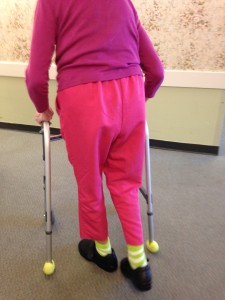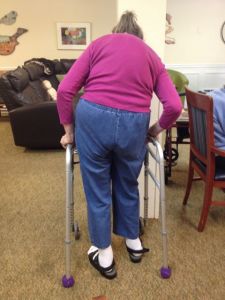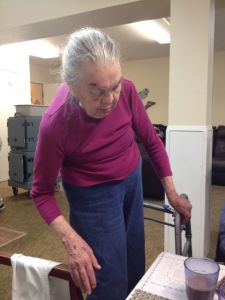
by Diane Masson | Aug 16, 2015
 I asked the same question to four memory care communities that were licensed as assisted living. The responses might surprise you and help you determine where to place your own mom or dad.
I asked the same question to four memory care communities that were licensed as assisted living. The responses might surprise you and help you determine where to place your own mom or dad.
What happens if my mother-in-law wakes up disoriented at 2:00 AM and gets up to find the bathroom? Then she falls…
Memory Care Community A – “When we find her, a med tech would evaluate her. If she hit her head or something major happened, then 911 is called. My husband asked about the med tech training. Is it like an emergency medical technician (EMT) with a minimum of 140 hours of medical training? She said, “No, it is like a CNA (Certified Nursing Assistant). There are specific criteria that they are trained on.”
Does someone go with the dementia resident if they go out 911? No!
Diane’s opinion: In my experience, no CNA has the medical expertise to make a judgment call on a fall. My mother’s assisted living community always sent my mom out 911 from a fall in the middle of the night. It happened five times. It was highly traumatic for her. When someone arrives at the emergency room with dementia, it is scary and confusing. It would disorient her for days after each traumatic adventure.
Memory Care Community B – “We have certain guidelines to know when to call 911. In the past month we have had two seniors go out 911. Eighty percent of the time falls do not require 911. We would call the family to meet the senior at the hospital.”
Does someone go with the dementia resident if they go out 911? No!
Diane’s opinion: Some assisted living communities ship senior residents out by 911 because they don’t want liability of a mistake. The pattern I am noticing is that if a community is licensed as an assisted living (board and care) and they do not have a 24-hour nurse, they get shipped out by 911 after a fall during the night.
Memory Care Community C – “If she got up at 2:00 AM, the motion sensors go off and a care manager goes into her room immediately. There are two care managers and a nurse. She will be assessed. If she is okay they will try to help her complete what she was trying to do initially, like going to the bathroom. If the fall is major, then the care manager will go to the hospital with them. If it is not major, she will be continually monitored every 15 minutes.”
Does someone go with the dementia resident if they go out 911? Yes!
Diane’s Opinion: This was the most impressive answer I received to my question. This community had a nurse on staff 24-7 and was priced at the high end of memory care communities. Bad news: My mother-in-law lived at this memory care community and fell. The answer they gave above does not match the reality of what happened. My mother-in-law was found on the floor beside her bed for an undetermined amount of time. Fortunately, she did not have to go out 911.
Memory Care Community D – “A motion sensor goes off, we assess her, and the nurse can be called. We are hesitant to send them out 911 unless absolutely necessary. We do send them out if they have had a head injury. Some places just call 911 but it is too hard on the families. A staff member will go with them to the emergency room.”
Does someone go with the dementia resident if they go out 911? Yes!
Diane’s Opinion: This memory care community had a nurse 14 hours a day. The longer they have a nurse on staff in a 24-hour period of time the more likely they have enough staffing to accompany a resident to the emergency room. Good news: My mother-in-law lived at this memory care community too. She fell and they did accompany her out 911 on several occasions. Thank you!
What Happens When a Senior Falls at 2:00 AM in Assisted Living?
This is a vital question that you need to ask in order to evaluate and choose an assisted living or memory care community for your loved one. Be proactive. Be an advocate. When someone has dementia it is very difficult for them if you pull them out of their normal routine, it can mess them up for days or weeks depending upon the severity of his or her dementia. Assisted living and memory care communities should not send out a dementia resident without accompaniment. My poor mother was always terrified and disoriented at the emergency room.
What has been your experience?
Your Senior Housing Options,” has a simplistic title, but what’s inside this new book can save a you months of research time. Hear Diane Masson’s interview of how her mother and in-law’s faced the pivotal decision to plan ahead or wait until a crisis. Learn the pitfalls from transitioning from your home to senior housing. Understand what questions to ask, insider tips and dirty secrets revealed. The decision to stay home requires caregivers. Prevent elder abuse by determining if a home care agency is reputable, before they move into your home. You are just not looking for today’s needs, but for your future care. Discover key differences between rental facilities vs Continuing Care Retirement Communities. Do you have enough financial resources if you need to be in a higher level of care for an extended period of time? For weekly tips join at: Www.Tips2Seniors.com
Diane Masson has worked in senior housing for 17 years and is the regional marketing director for two debt-free Continuing Care Retirement Communities in Southern CA (Freedom Village in Lake Forest and The Village in Hemet). Her first book “Senior Housing Marketing – How to Increase Your Occupancy and Stay Full,” is being utilized by senior housing professionals across the country. Both her first book and second book, “Your Senior Housing Options,” have a 5-star rating on Amazon.com.

by Diane Masson | Jul 19, 2015
 End of life decisions are so difficult for an advocate to make for his or her’s senior parent. A few months ago, I had to make tough choices for my mom before she passed. A month ago, my husband and his family faced difficult choices for his dad.
End of life decisions are so difficult for an advocate to make for his or her’s senior parent. A few months ago, I had to make tough choices for my mom before she passed. A month ago, my husband and his family faced difficult choices for his dad.
My father-in-law, Bill, had been on home hospice with 24/7 care for about three months. He was frail (worn out from being a caregiver for his wife who had Alzheimer’s), had inoperable blockages in his heart, had four small strokes that my sister-in-law witnessed and was frustrated with early dementia.
He was reaching for the cat when he fell.
The hospital determined that his pelvis was fractured in multiple locations and his femur (thigh bone) was broken. So Bill would be bed ridden the rest of his life. Sigh…he was in so much pain.
They were turning Bill every two hours to prevent bedsores. He could only be on his back and the side without the broken femur. He was a two-person transfer.
The fall that sent him to the hospital was a non-hospice related incident so it was covered by insurance. With no hope of improvement the hospital determined that he was once again comfort care. So according to the hospital, he was a hospice patent who needed to move out of the hospital or pay privately.
The only skilled nursing care facility in the area was not an option (bad reputation). There were no hospice facilities in the local area.
So the only two choices were:
- Stay in the hospital for a cost of $48,000 a month.
- Go home with two around-the-clock caregivers for a cost of $32,000 a month (because he was a two person transfer). The going home option would require my sister-in-law to stay home (she works full time) and manage the caregivers. The family would have to reimburse her normal salary.
My wonderful but exhausted sister-in-law found a temporary solution, which she badly needed. It is called hospice respite care, which includes a 5-day stay. Medicare Part A will pay for up to five days of respite care for a hospice patent who is otherwise cared for in the home. It gives a break to the caregiver. It can be provided in a hospice facility, nursing home or hospital. So we started the 5-day clock and didn’t have to move Bill. He was so frail and moving him would have been horrible painful. He died about three days later, pain free, with family at his side.
He worked hard his whole life and the family agreed upfront to pay the $48,000 a month after the respite 5-day stay.
What if a senior does not have this kind of money or a home to sell?
My own 92 year old mother died in skilled nursing care on Medi-cal. It was in a caring compassionate 5-star rated skilled nursing community called Freedom Village in Lake Forest, CA. My mom was lucky. Many skilled nursing facilities that offer Medicaid assistance are not wonderful experiences.
Families need to research choices, advocate and make the best end of life decisions possible at the time.
Hospice Note: Our family’s goal was for Bill to die at home. My sister-in-law was fully prepared through hospice to make this happen. Bill’s devastating fall that required a two person transfer changed the situation. Just shifting him in his hospital bed was horribly painful. We could not imagine moving him in a ambulance at this point to any another location.
This situation is still very raw for me and it has taken me over a month to be able to write about this topic in my blog.
Your Senior Housing Options,” has a simplistic title, but what’s inside this new book can save a you months of research time. Hear Diane Masson’s interview of how her mother and in-law’s faced the pivotal decision to plan ahead or wait until a crisis. Learn the pitfalls from transitioning from your home to senior housing. Understand what questions to ask, insider tips and dirty secrets revealed. The decision to stay home requires caregivers. Prevent elder abuse by determining if a home care agency is reputable, before they move into your home. You are just not looking for today’s needs, but for your future care. Discover key differences between rental facilities vs Continuing Care Retirement Communities. Do you have enough financial resources if you need to be in a higher level of care for an extended period of time? For weekly tips join at: Www.Tips2Seniors.com
Diane Masson has worked in senior housing for 17 years and is the regional marketing director for two debt-free Continuing Care Retirement Communities in Southern CA (Freedom Village in Lake Forest and The Village in Hemet). Her first book “Senior Housing Marketing – How to Increase Your Occupancy and Stay Full,” is being utilized by senior housing professionals across the country. Both her first book and second book, “Your Senior Housing Options,” have a 5-star rating on Amazon.com.

by Diane Masson | May 31, 2015

Will the POA understand new shoes are needed?
It’s hard to be an advocate for a senior for years on end. I advocated for my own mom (with vascular dementia) for over 10 years, until I recently lost her. Advocacy is not an easy job and it can entail sleepless nights of concern.
It’s vital to select a Power of Attorney (POA) who currently knows you well enough. If you can no longer speak on your own behalf, your POA needs to know if you are over medicated or sedated just by looking at you. They need to know your baseline so they can help you and reverse the issue or accelerate an outcome in a timely fashion.
The POA’s main purpose is to comply with your wishes that were indicated before you became incapacitated. They should always protect your best interests both mentally and physically.
Over medication is a growing problem for seniors. I have heard many stories of hospitals overmedicating seniors. My own mother-in-law was over sedated in the emergency room. She has Alzheimer’s. They had no room in the psych ward and she was drug restrained for three days and two nights in the emergency room. Sigh…
It has taken us four months to get my mother-in-law off Haldol. Psychotropic drugs and dementia do not mix well. Her POA thought the doctors understood what they were doing tapering off the medication. Unfortunately, my mother-in-law’s doctor admitted to knowing nothing about psychotropic drugs and was relying on others to advise her. Gulp… What a mess! We are talking about seniors’ lives…
Neither the doctor nor the POA knew what to do about my mother-in-law’s medications or where to begin. It literally required a family member taking my mother-in-law to her doctor and demanding, in person, for the Haldol to terminate immediately. The doctor could see for herself the sedation instead of relying on the input from home health professionals. The weird part was the doctor agreed to terminate the Haldol in three days. We wondered why wait three days? It turned out she wanted a psych nurse to visit my mother-in-law while she was still on the Haldol. The psych nurse agreed to terminate the Haldol too. Here is the horrible part; the psych nurse ordered a different psychotropic drug on an as needed basis. What?? It took the family helping the POA another week to reverse that fiasco.
Why are doctors prescribing psychotropic drugs to seniors with dementia in the first place?
A POA needs to be vigilant. It may require educating themselves about medications that they no nothing about. Very few POA’s are doctors and nurses. If you are the parent of a doctor or nurse who will be your POA, then congratulations are in order for you.
What about a senior with neuropathy in his or her feet? Something as simple as buying quality shoes, so a senior has better balance is key. Will the POA do it?
What if your POA is an attorney or an absentee POA relative who rarely visits, how can they understand or advocate for your needs?
A POA needs to be willing to speak to the doctor on your behalf. Some possible POA’s are very direct (speak their mind) and others are indirect (prefer to fade into the background). Some folks are introverted and others are extroverted. Who are you asking to be your POA? Will they get the job done? This is not a position for sissies. Your POA needs to be hardcore if you are in dire need. Your POA may have to spend relentless hours pursuing a medication result that is beneficial for your needs.
What have you encountered? Who have you selected to be your POA? Do you feel good about your decision?
Don’t wait until you’re in a health care crisis like author Diane Masson’s in-laws. It has been a nightmare for her in-laws and all the adult children. Research your future choices NOW to avoid being “put” somewhere, or having decisions made for you by others. “Your Senior Housing Options” is a new resource book available on Amazon.com with a 5-star rating. It offers a step-by-step guide to the options, including staying home.
Seniors, Boomer children, spouses, family members and caregivers are desperate to learn how to truly differentiate good senior housing from mediocre at best. Diane Masson’s new book will answer these heart-wrenching issues in an easy, simple, story telling format with humorous illustrations.
Diane has worked in senior housing for 17 years and is the regional marketing director for two debt-free Continuing Care Retirement Communities in Southern CA (Freedom Village in Lake Forest and The Village in Hemet). Her first book “Senior Housing Marketing – How to Increase Your Occupancy and Stay Full,” is being utilized by senior housing professionals across the country.
For weekly tips and advice go to www.Tips2Seniors.com and learn more from author and senior housing expert Diane Twohy Masson.

by Diane Masson | May 17, 2015

Drug Restraints and the Haldol Shuffle
Adult children just want their parent with dementia to be okay. Most do not have a clue on psychotropic (mind altering) medications or how they work. Families rely on professionals to recommend doses and medications for their senior parents. If a professional doctor or memory care community says that our mom or dad needs these medications, we tend to accept their wisdom. We are programed to not question authority. Yet when a parent is sedated in a drugged stupor over an extended period of time, more adult children are starting to ask why. At this point it can be too late for a senior with dementia.
Psychotropic medications can have a lasting affect on a senior with dementia.
Seniors may never be able to return to their baseline, before taking psychotropic drugs. My mother-in-law was given Haldol and now does the Haldol shuffle. It is a continuous stand up, walk, sit down and then it starts all over again. It is so sad to watch and they can’t stop. A professional told me it’s like their skin is crawling and they have to keep moving to make the feeling go away.
When we recently brought my mother-in-law her favorite Greek food for lunch, she sat down in front of her favorite foods at the table and then immediately stood back up and started the Haldol shuffle again. She had no desire to eat her favorite foods.
It has taken four months for the family to get her off the Haldol. My sister-in-law had to physically take my mother-in-law to her primary care physician and demand for the Haldol to be discontinued last week. The doctor was shocked my mother-in-law had been on Haldol for such a long period of time, with no recorded outbursts requiring such a strong medication.
So what happened?
My father-in-law, Bill, and mother-in-law, Amy, refused to move from their home of 56 years. Bill had been Amy’s caregiver for the last four years because she had dementia. When Bill had a sudden heart attack and went to the hospital, Amy was in jeopardy in the family home. The local children rallied around the dad in the hospital. For all intensive purposes, Amy was left alone for three days and three nights. My husband and I live 1000 miles away and we hired a geriatric care nurse. Amy was having delusions, not recognizing her own children, making unsafe choices, refusing to take her medications and eloped (she walked away and the police brought her home).
No community would accept her without medications
No assisted living would take her, because she had eloped. A memory care community came to assess whether they would accept Amy and said they would not take her unless she was medicated. The family understood drugs were a requirement at this point. My sister-in-law called Amy’s doctor’s office and explained Amy symptoms of delusions and etc., they did not want her in the clinic. Are you kidding me?!!? Amy’s doctor’s nurse said to take her to urgent care. But according to urgent care she was not bad enough to be admitted to the hospital. They sent her home with five pills of Adavan. Now what? Medications were required live in the memory care community. What could we do? She was not safe at home by herself and she didn’t want her adult children (she no longer recognized) to be with her. Finally a geriatric nurse provoked Amy to hit her. Then the police came and Amy was taken to the hospital by ambulance. There was no room in the psych ward so she was drug restrained in the emergency room for three days and two nights.
So the psychotropic nightmare began
The hospital said strong medication was necessary and started the Haldol. She was in the hospital for three weeks. Both memory care communities said the medications were necessary for Amy too. The family stupidly believed the professionals. Amy’s HMO had poor communication between the doctor, the hospital, the memory care communities and the home health professionals that saw Amy in person.
The first memory care community recommended making no drug changes for one or two months. When my husband and I flew to Seattle and saw Amy’s level of sedation, I said, “No way,” and fought to have the Haldol reduced by half. After the family figured out that the memory care community had no intention of supporting the reduction of medications, we moved Amy.
The second memory care community promised to reduce the psychotropic drugs and get her off the Haldol. Within two weeks they reduced the Haldol by half. Yet Amy was still in a drugged stupor. She was on a mix of AM and PM psychotropic drugs. This secure memory care community had a staffing ratio of one staff to ten residents.
We have since learned that drug restraints in memory care are common, particularly if they are short staffed.
I wrote this article to warn others adult children to demand reductions in psychotropic medications immediately. I am so sick of professionals saying to wait a month or more to see what happens with the medications. Then it’s too late. Amy went from fully toileting herself to incontinent. She went from eloping (walking away and the police brought her back) to barely walking. She went from smiling and talking to having a blank look on her face and staring into space.
We want to find Amy’s baseline again. She will never be at the same level of cognition from four months ago. There are moments and sentences were her personality returns. It is so sad to see her in this reduced state.
I am not saying that I am anti-drugs, but a Power of Attorney (POA) needs to be informed of the consequences of psychotropic medications. My own mother with dementia benefited from psychotropic drugs when she became very anxious and delusional in the later stages of her dementia. The price she paid for taking those psychotropic medications was permanently losing the ability to walk. I wish I had known then what I know now. Now my mother-in-law can barely walk…
Any hope? Have you had a similar experience with your parent? What happened? Have you witnessed drug restraints in memory care communities or hospitals? How can we stop it? How can a family find a good memory care that does not require drug restraints? What are the proper questions to ask?
Don’t wait until you’re in a health care crisis like author Diane Masson’s in-laws. It has been a nightmare for her in-laws and all the adult children. Research your future choices NOW to avoid being “put” somewhere, or having decisions made for you by others. “Your Senior Housing Options” is a new resource book available on Amazon.com with a 5-star rating. It offers a step-by-step guide to the options, including staying home.
Seniors, Boomer children, spouses, family members and caregivers are desperate to learn how to truly differentiate good senior housing from mediocre at best. Diane Masson’s new book will answer these heart-wrenching issues in an easy, simple, story telling format with humorous illustrations.
Diane has worked in senior housing for 17 years and is the regional marketing director for two debt-free Continuing Care Retirement Communities in Southern CA (Freedom Village in Lake Forest and The Village in Hemet). Her first book “Senior Housing Marketing – How to Increase Your Occupancy and Stay Full,” is being utilized by senior housing professionals across the country.
For weekly tips and advice go to www.Tips2Seniors.com and learn more from author and senior housing expert Diane Twohy Masson.

by Diane Masson | May 10, 2015

Comatose in Memory Care
My mother-in-law who got over drugged in the hospital several months ago is now in her second memory care community in Seattle. The first high-end memory care community in downtown Seattle wanted to follow the doctor’s recommendations of sedation. It took me three days to get the drugs reduced by half after I saw my overmedicated mother-in-law. Then the second memory care community promised our family that they would get her off the reduced Haldol dose. We believed them and paid a hefty community fee (a one time move-in fee) Sigh…
It’s been almost two months in the second Memory care.
We had an unproductive care conference about two weeks ago. When the family talked about changing the psych drugs the conversation led to considering Amy as a candidate for hospice because she was not eating. What? It turns out one of the drugs she began in the hospital was also an appetite suppressant.
She was overmedicated in the hospital because there were no rooms in the psych ward, so my mother-in-law stayed in the emergency room for three days and two nights. Getting the picture of sedation now?
My sister-in-law is on the warpath. She is demanding changes for her mom and talking about moving her to a third place. Will it help?
The second memory care called my husband to see if they could save the move out. He simple said, “You have known that the family wanted my mom off the Haldol. How many phone calls and faxes have you made to the doctor to make that happen?” The administrator started to back pedal.
My sister-in-law took my mother-in-law to her doctor yesterday. A 15-minute appointment turned into nearly hours. The doctor is going to take her off the Haldol but does not have a clue what medications will help or are necessary. My mother-in-law has significant dementia, and seemed to have had a psychotic break when she lost her home of 50 years and her husband within a week.
Why is it so hard to unsedate a senior who cannot speak on his or her own behalf? Is it easier for the memory care staff if the residents are half sedated? Can anyone help us on how to turn this around? Any tips on psychotropic drugs? Which ones are best?
Don’t wait until you’re in a health care crisis like author Diane Masson’s in-laws. It has been a nightmare for her in-laws and all the adult children. Learn how to plan ahead like Masson’s mom. Research your future choices NOW to avoid being “put” somewhere, or having decisions made for you by others. “Your Senior Housing Options” is a new resource book available on Amazon.com with a 5-star rating. It offers a step-by-step guide to the options, including staying home.
Seniors, Boomer children, spouses, family members and caregivers are desperate to learn how to truly differentiate good senior housing from mediocre at best. Diane Masson’s new book will answer these heart-wrenching issues in an easy, simple, story telling format with humorous illustrations.
Diane has worked in senior housing for 17 years and is the regional marketing director for two debt-free Continuing Care Retirement Communities in Southern CA (Freedom Village in Lake Forest and The Village in Hemet). Her first book “Senior Housing Marketing – How to Increase Your Occupancy and Stay Full,” is being utilized by senior housing professionals across the country.
For weekly tips and advice go to www.Tips2Seniors.com and learn more from author and senior housing expert Diane Twohy Masson.

 I asked the same question to four memory care communities that were licensed as assisted living. The responses might surprise you and help you determine where to place your own mom or dad.
I asked the same question to four memory care communities that were licensed as assisted living. The responses might surprise you and help you determine where to place your own mom or dad.



